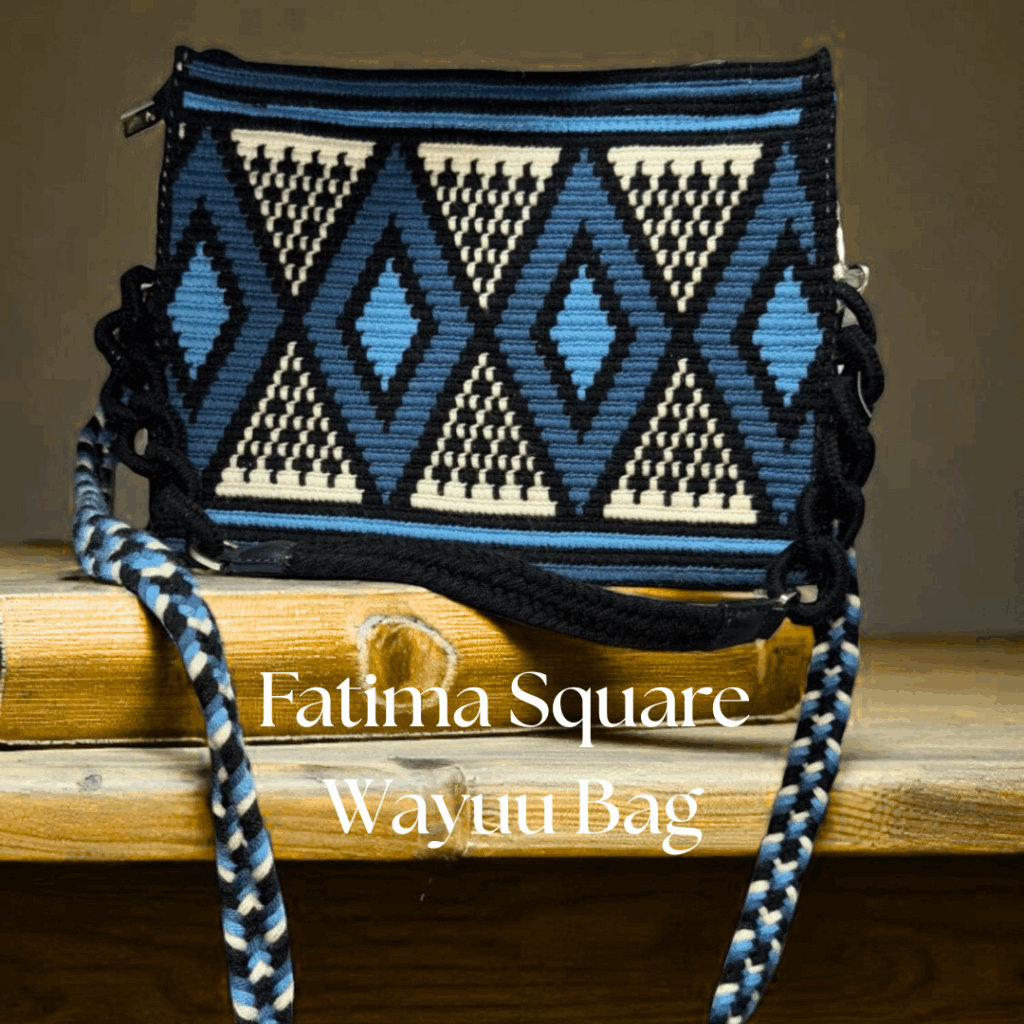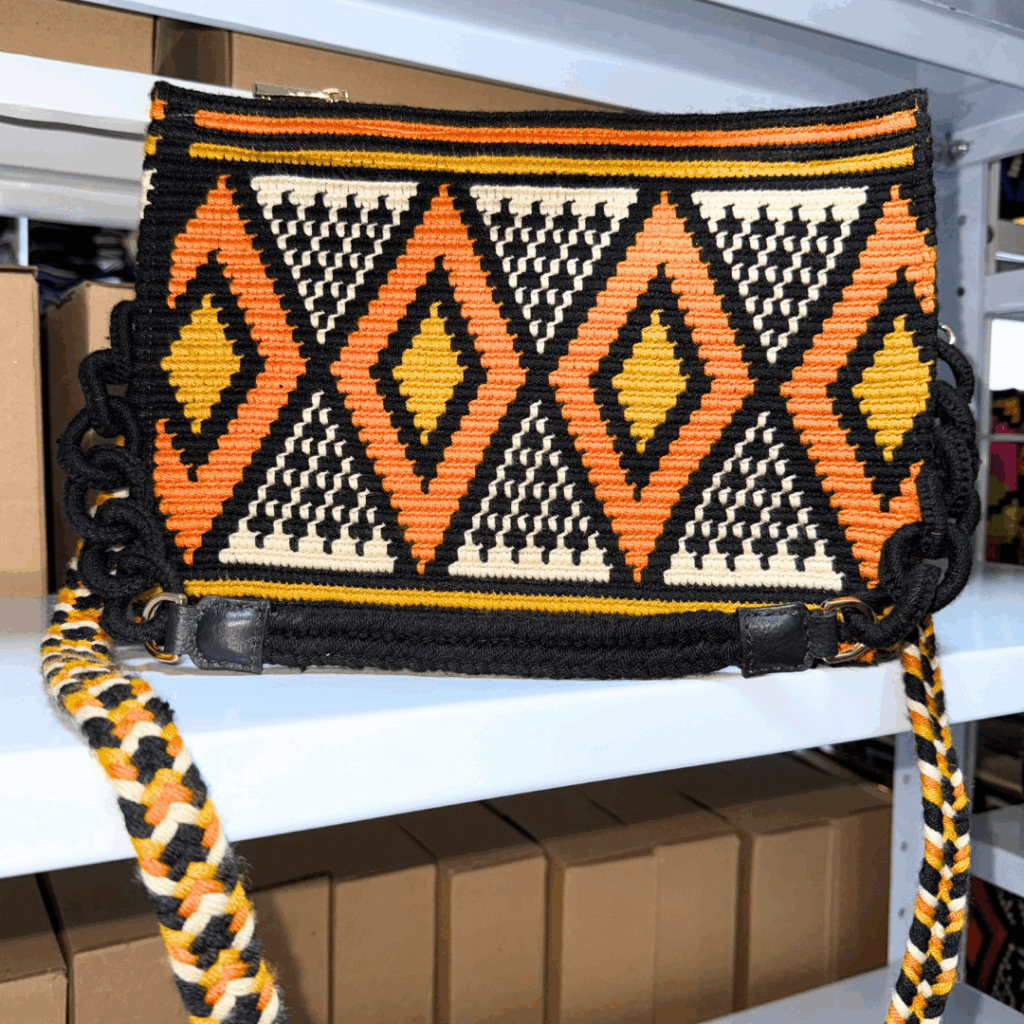
Find the Fatima Wayuu bag here.
The fashion world is increasingly drawn to pieces that tell stories — pieces that go beyond trends and connect with heritage, art, and identity. Wayuu handbags are exactly that: timeless handcrafted treasures created by Indigenous artisans from northern Colombia. But what exactly are Wayuu bags, and can they be considered handbags in a modern sense? In this article, we’ll explore what makes these bags unique, whether they can fit the “handbag” category, and how you can get your own authentic piece through Cosecha Bags.
Wayuu bags are traditional handcrafted bags woven by the Wayuu people, an Indigenous community that inhabits La Guajira, a desert region in northern Colombia and parts of Venezuela. Weaving is a sacred tradition for the Wayuu, especially among women, who learn this intricate art from a young age. Every bag, or mochila, is a labor of love and can take several days, or even weeks, to complete.
Each Wayuu bag is more than just a functional accessory. It’s a representation of Wayuu cosmology, beliefs, and everyday life. The geometric patterns, known as “kanaas”, symbolize elements of nature, mythology, and spirituality. No two bags are ever alike, making each one a unique cultural artifact.
Traditionally, these bags are used for carrying personal items or food, but over time, they have found their way into fashion scenes around the world due to their vivid colors, strong symbolism, and ethical appeal.
Absolutely. While the term “handbag” usually refers to a certain style or format in Western fashion — often structured, carried by hand, and smaller than a tote, many modern adaptations of Wayuu bags fit this description.
Thanks to creative collaborations and evolving designs, Wayuu handbags now come in multiple shapes and sizes. Some have shorter handles or leather accents, making them easier to carry as handbags. Others have structured bases or added closures that align with the typical handbag functionality while preserving the Wayuu essence.
So yes, Wayuu handbags do exist, and they’re not just stylish; they’re also full of meaning.
Yes, and many designers and artisan-led brands are doing exactly that. Traditional Wayuu mochilas are typically crossbody-style, with long, woven straps and a rounded, bucket-like shape. While beautiful, they may not always suit modern urban lifestyles or formal settings.
To meet evolving tastes and expand their versatility, many artisans are:
These changes do not take away from the authenticity of the bags, on the contrary, they represent a fusion of cultures: Indigenous heritage meeting contemporary fashion.
If you’re looking for a handbag that stands out, sparks conversation, and supports ethical craftsmanship, a Wayuu handbag is the perfect choice.

If you’re wondering where to find authentic, high-quality Wayuu handbags, look no further than Cosecha Bags. At Cosecha, we work directly with Wayuu artisans to ensure each piece is made with care, cultural respect, and fair compensation.
Our collection features:
When you shop at Cosecha Bags, you’re not just buying a beautiful accessory. You’re supporting:
Visit @cosechabags to explore our latest designs and bring home a Wayuu handbag that carries history in every thread.
Wayuu handbags are far from fleeting fashion trends, they are soulful pieces of art. Each woven bag is a functional masterpiece, a living heritage that blends beauty, purpose, and deep cultural meaning. Whether you choose a traditional mochila or a modern reinterpretation, you’re carrying more than an accessory — you’re carrying a story woven with patience, identity, and ancestral pride.
By choosing one, you’re not only elevating your personal style; you’re joining a movement that values craftsmanship, honors Indigenous roots, and embraces fashion with conscience.
Discover our online store featuring a stunning collection of Wayuu bags. Shop now and embrace the beauty of tradition!